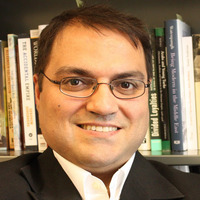Thursday, April 23, 7:00pm
Bedross Der Matossian, University of Nebraska, Lincoln
The Armenian Genocide Historiography on the Eve of the Centennial: From Continuity to Contingency
Humphrey Forum, Humphrey School of Public Affairs
open to the public
One of the outstanding issues in Armenian Genocide historiography has been the inability of historians to come to a consensus regarding the causes, the aim of the perpetrators, and the process of the genocide. This is due to the fact that the field of genocide studies by its nature is contentious. While most Western and some Turkish scholars agree to the fact that the events that happened to the Armenians during World War I constitute genocide, they tend to disagree on critical issues such as the causes, motives, premeditation, and the actual process itself. Over the course of the past two decades, the historiography of the Armenian Genocide has evolved through the introduction of new methodologies, approaches, and more complex analyses of the Genocide that venture beyond rudimentary and essentialist arguments and representations. These approaches range from arguing that religion and/or nationalism were the main factors that led to the Armenian Genocide, to the argument that the genocide was a contingent event that took place during World War I, represented by a rapid radicalization of the government's policy towards the Armenians. This talk will discuss the development of the historiography of the Armenian Genocide by concentrating on some of the major trends in the historiography and assess their contribution to the understanding of the different dimensions of the genocide. Furthermore, it will provide suggestions about strengthening certain areas in the historiography that still remain in their infancy.

Bedross Der Matossian is an Assistant Professor of Modern Middle East History in the Department of History at the University of Nebraska-Lincoln. Born and raised in Jerusalem, he is a graduate of the Hebrew University of Jerusalem, where he began his graduate studies in the Department of Islamic and Middle Eastern Studies. He completed his Ph.D. in Middle East History in the Department of Middle Eastern, South Asian, and African Studies at Columbia University in 2008. From 2008 to 2010, he was a Lecturer of Middle East History in the Faculty of History at the Massachusetts Institute of Technology. For the Spring quarter 2014 he was appointed as the Dumanian Visiting Professor in the University of Chicago. His areas of interest include ethnic politics in the Middle East, inter-ethnic violence in the Ottoman Empire, the history of the Armenian Genocide and modern Armenian history. In addition to contributing to numerous edited volumes, his articles have also appeared in the Journal of Palestinian Studies, Jerusalem Quarterly, Armenian Review, Majallat al-Dirasat Al-Filastiniyya, European Journal of Turkish Studies, Genocide Studies and Prevention: An International Journal, Journal of the Society for Armenian Studies, Turcica, and Ararat Quarterly. He is the author of Shattered Dreams of Revolution: From Liberty to Violence in the Late Ottoman Empire (Stanford University Press, 2014).
Organized by the Arsham and Charlotte Ohanessian Chair, Professor Joachim J. Savelsberg.

